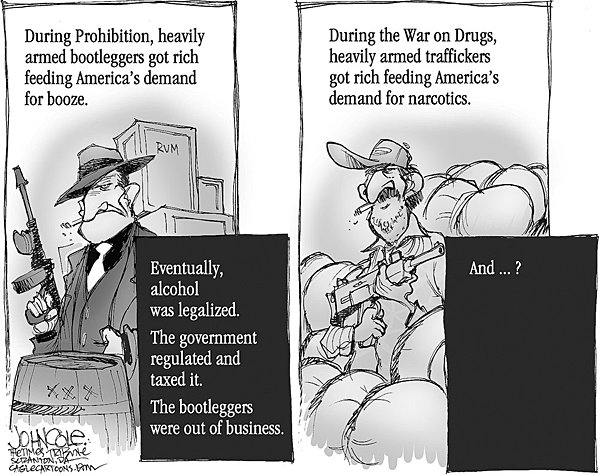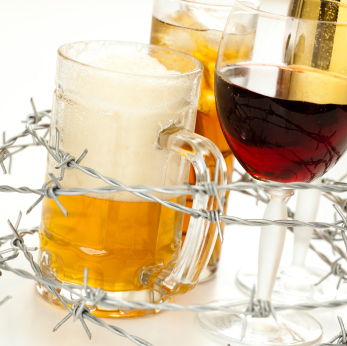
| ||
|
|

The "Noble Experiment" turns out to be just another bad conservative idea.
Was there ever really a time when the whole country was conservative? Why yes, students, there certainly was. It was the time called Prohibition, and it's an extremely instructive lesson on how conservatism actually works when given its head. This was a time when Protestant morality was imposed upon all citizens, rights were taken away, the Constitution hastily amended, and a sizeable majority of Americans, from the Ku Klux Klan to the NAACP, from the conservative South to liberals in the North, agreed it was a glorious victory for "traditional values." Of course it was really no such thing.
No, Prohibition was an attempt to return to the fuzzily recalled "values" of the pious Pilgrims and Puritans and Quakers of early Anglo America, when, presumably, the populace lived in sober bliss, peace and prosperity. In fact, that image of early America is another conservative myth: the Pilgrims landed at Plymouth Rock, rather than continuing further south, only because they ran out of beer!
The promoters of Prohibition called it the "Noble Experiment." The push to outlaw all alchoholic beverages was led by white Protestants: Methodists, Baptists, Presbyterians, Disciples of Christ, Congregationalists, Fundamentalists, Quakers and Scandinavian Lutherans, along with "patriotic" Americans who distrusted the wine, beer and whiskey-infused culture of immigrants, and weren't too keen on the idea of recently liberated black Americans getting their uppities under the influence of the devil's drink. They were joined by erstwhile liberals, who in a fit of temporary insanity abandoned their staunch belief in liberty and pursuit of happiness (which is often accompanied by some sort of accelerant) for the utopian belief that banning booze would benefit women, children, the poor, immigrants and black Americans. So we can already see the contradictory logic of Prohibition long before it even begins. The very people conservatives were looking to control, liberals were seeking to help. Opposing the ban were free-swilling Catholics, Episcopalians, German Lutherans, most immigrants, everybody associated with the beer and spirits industry, virtually all businessmen (except those selling soda drinks), most doctors (whose medicinal "cures" were primarliy simply alcoholic elixirs), and the few scattered pragmatists who could envision the probable results. Sure enough, it was an utter disaster. Imposing a religious-based strict morality upon 100 million people is sure to be problematic. But when that morality is intended to completely eliminate a pleasurable habit that humankind has partaken of for millennia, the attempt is surely foolhardy. But such is conservative ideology. Then, as now, conservatives are quick to shelve their supposed rock-solid belief in personal liberty, and states' rights, and instead wholeheartedly support Big Federal Government when it comes to forcing their "traditional values" upon everybody else, most particularly upon those "others" who don't share those values. Whether its Prohibition, or the Ten Commandments in the courthouse, or banning something they don't like, such as marijuana or abortion or sodomy or interracial or gay marriage, they seek laws that encode their religious beliefs, and force law enforcement agencies, including the federal government, to come right into your bar room, your bedroom, your hospital room, or even your uterus, in order to uphold their law. That's the kind of individual rights conservatives believe in. You have the right to believe the way I do... or I will force it upon you. And, of course, the best and mightiest of the laws of the United States is the Constitution. It's the Holy Grail of conservative law-makers. Just as today's conservatives seek a Constitutional amendment defining marriage as strictly between a man and a woman, thereby forever stripping "other" Americans of fundamental liberty, equality, justice and pursuit of happiness, the conservatives supporting Prohibition stampeded right past "states' rights" and focused on obtaining a Constitutional amendment banning alcoholic spirits. They would get it. Prohibition was the brainchild and primarily organized by social conservatives (SoCons). The Womens Christian Temperance Society, then later the Anti-Saloon League, two conservative groups, led the charge. The corporate conservatives (CorpCons) of the era at first dismissed as mere pests the gaggle of unsophisticated religious, rural and small-town hicks promoting Prohibition, but then watched helplessly, and in horror, as the fervor grew across the country. On January 16, 1920, the day the 18th Amendment to the Constitution of the United States went into effect, they cried in their beer as the nation's fifth largest industry was shut down by a wave of social conservatism (something they may be wise to carefully consider today as they attempt to sham this same mob). The usual slate of conservative states and personalities were implicit in bringing on Prohibition. Texas Senator Morris Sheppard, a conservative Democrat (remember this was back when most social conservatives in the South were Democrats), introduced the Prohibition Amendment to Congress. The first eight states to hurry to ratify the amendment were Mississippi, Virginia, Kentucky, North Dakota, South Carolina, Maryland, Montana and Texas, red states all. Eventually all of the states except two, blue states Connecticut and Rhode Island, would vote for the amendment. But they really didn't know what they were voting for. The wording of the amendment was so vague that most voters thought they were just making illegal saloons and "intoxicating liquors" like whiskey, rum and gin; they assumed that beer and wine would continue to be widely available. But after ratification of the amendment, they got snookered. The Volstead Act, conceived and drafted by the conservative Anti-Saloon League's crafty leader, Wayne Wheeler, defined "intoxicating liquors" as any beverage containing over 0.5% alcohol by volume. That included beer and wine. Deception: a long-standing conservative tactic in politics. President Woodrow Wilson, a good liberal (usually), tried to stop the madness by vetoing the Volstead Act. But Congress overrode the veto - with the opposition forces, liberals and CorpCons (generally strange bedfellows) - swamped by social conservative sentiment. The 18th Amendment to the Constitution, the first amendment ever to take away a right from the American people, went into full effect. The law did effectively kill the saloons, those parlours of masculine camraderie, card games and occasional fisticuffs (or worse). They were never to come back in their previous incarnation. But otherwise Prohibition had pretty much the opposite effect of bringing "morality" to the masses: in reality, it made tens of millions of Americans criminals. Most citizens who had originally supported Prohibition came to hate it, especially as the full toll of consequences became apparent. The saloons were quickly replaced in the big cities by speakeasies, hideaways where a knock and a password would get you (and your girl) a drink. Prohibition prompted ladies to infiltrate the bar, and so was born a new "immorality" that had barely existed before: female intoxication and alcoholism. The spirit of the decade for which the "Roaring Twenties" is now most remembered is a crazy mixture of jazz clubs, women's lib, flapper girls, and, of course, wildly speculating and hard-drinking financiers, all in their own way openly defying Prohibition. Of course, when you make something illegal, its value skyrockets. Bootleggers quickly discovered that contraband booze was a veritable gold mine. Graft, bribery, corruption and bloody turf wars spread across the land. The Swiss cheese ideology of conservatives back then (same as it ever was) combined belief in Big Government to impose morality, with low, low taxes which couldn't fund its enforcement. So there was never enough law enforcment at any governmental level to control the tide of violent lawlessness by thugs, gangs and the empowered Mafia, much less the willfull but petty flouting of the law by millions of otherwise law-abiding Americans. The era of great morality Prohibition was supposd to usher in had become instead a great farce. But, as usual, its conservative backers wouldn't give up so easily. As the nation soured on Prohibition, the social conservatives would not budge a whit. A frustrated populace urged politicians to exempt beer and wine from prohibition, but the prohibitionists wouldn't give a millimeter. Then, as now, SoCons will not compromise. In fact, they doubled down on their moral certitude by bringing back one of their longtime favorite Puritanical tactics: stiff punishment. They passed "Three Strikes, You're Out" laws in some states, requiring long prison terms for the unfortunate rounder, and fines of up to $5,000 (that would be over $100,000 in current dollars!) for being caught with a flask. They demanded that cops enforce prohibition laws, even though petty drinking cases had overwhelmed the legal system, and the cops, themselves, were busy drinking at home. In their righteousness, these conservatives had no reservations about steering the nation toward a fascist police state. Thankfully they were mostly thwarted in this vicious and un-American drift by unlikely allies of Yankee liberty and justice: the bootleggers and mobsters, who could simply pay the cops and politicians to lay off. Three conservative Republican presidents - Harding, Coolidge and Hoover - went right along with the insanity. So did the conservative Congress, even though most of them were tipping the wee mug in plain sight. Actually, just about everyone was. Not only were the big cities swarming with speakeasies, the countryside, including in the South, was bubbling with moonshine and white lightning. Local hillbillies not only wanted their spirits, they had likewise discovered along with the city mobsters how valuable and lucrative something became when it was illegal. Meanwhile, the wealthy had not much bothered with Prohibition at all; their wine cellars and private liquor stocks remained free-flowing the entire time. The nation had never before been so full of illegals and hypocrites. In 1933, new President Franklin Roosevelt modified the Volstead Act to allow the resumption of legal beer. The nation celebrated. But the 18th Amendment still stood. Though disappointed with the return of beer, its dogged conservative defenders took solace in the fact that no Constitutional Amendment had ever been rescinded. But there had never been a Constitutional Amendment as bad as the 18th. The new, more liberal, Congress took aim at it by submitting the 21st Amendment, which revoked the 18th, to the states for ratification. Thirty-five states rushed to ratify, and by the end of Roosevelt's first year in office, Prohibition was doomed. It ended officially on December 5, 1933, 13 unlucky years after it started. Many conservative states clung to the conservative ideology of Prohibition. South Carolina, North Carolina, Nebraska, Kansas, Mississippi, Oklahoma, Louisiana, North Dakota, South Dakota and Georgia failed to support the overtuning of the 18th Amendment. Even after the end of Prohibition, states were entitled to remain dry if they so elected; the usual suspects of red states did exactly that. They hadn't gotten enough of Prohibition, some continuing the ignorance, hypocrisy and folly right up through the 1950s. And, believe it or not, there is still a national "Prohibition Party," all conservatives, of course, who want to reinstate the inglorious days of yesteryear. Watch for their 2012 convention coming up in June, in (surprise, surprise) Alabama. The lessons of Prohibition are clear. Even if you have all the best moral intentions, you can't legislate religious morality. And Prohibition sprang fully formed from religious conviction, not rational thought. You can legislate safety and common sense, such as seat-belt laws, but not religious morality. Alcoholism was a problem before Prohibition. It was a problem during Prohibition. It is a problem today. Yet, then as now, the vast majority of people enjoying alcoholic beverages do it without harming themselves or others. Prohibition made a mess of everything. It did not decrease the rate of drinking, but in criminalizing the product it set loose a vortex of criminality. Of course, only the deaf, dumb and blind do not see the parallels between Prohibition and our "War on Drugs," another really bad conservative idea which attempts to ban a cultural tradition of imbibing natural plants and compounds that dates back to the earliest civilizations.

Criminalizing drugs, particularly marijuana which is far less destructive to both individual and community than either alcohol or tobacco, has simply criminalized millions of otherwise productive and law-abiding American citizens, filling jails and courts to the breaking point with innocuous "possession" arrests, spawning not just a nationwide but a global community of cartels, drug lords, gangs, thugs, and unbelievable violence that has rippled across America and now threatens to bring down entire countries. The "War ond Drugs" is Prohibition on steroids. And there is a direct line of descendence: many of the smugglers and dope-dealing syndicates in America actually learned their trade during Prohibition. Only conservative ideology keeps us wedded to this horrendous policy. As to the conservatives' proclivity for attempted tampering with the Constitution to impose their morality and take away rights, they are at it again, this time angling for a Constitutional Amendment barring gays and lesbians from marriage. They won't get it. Their time to get that one through was about 30 years ago. And if they had gotten it through, now they would be wriggling in despotic angst knowing that yet another really bad conservative idea was about to come tumbling down. It just never dawns on them -- how dare they? How dare they presume to force their religious values on an entire nation? There's places like that; they're called theocracies: Iran, Saudi Arabia, North Korea. But not America. Prohibition, the War on Drugs, a Constitutional amendment to ban gay marriage: we are left to wonder if conservatives will ever learn what America is really all about.
| |
|
| ||
 If there is anything that most assuredly deserves the term "tradition" it is humanity's insatiable appetite for making and guzzling intoxicating beverages and other substances.
If there is anything that most assuredly deserves the term "tradition" it is humanity's insatiable appetite for making and guzzling intoxicating beverages and other substances.